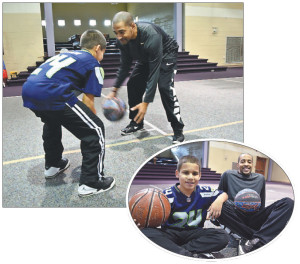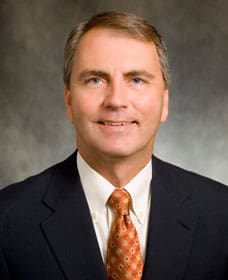Dad’s still in the game after MS leads to hip surgery

With his new hips, Kendrick Tate is able to play basketball with his son again.
Kendrick Tate picks up a basketball, slowly dribbles his way to the far side of the court just beyond the three-point circle. In one smooth, arching flick of the wrist, the ball strips the net. Whoosh!
What’s better than a three-pointer with your 9-year-old son watching? Not much.
“He’s the best shooter I know,” a grinning Preston McLeskey says of his Dad.
“Good answer,” his father responds with a smile.
They have the court all to themselves this afternoon as Tate, a 41-year-old single father of three, teaches his son the fundamentals of a game he so loved not that many years ago at Austin-East High School. Tate’s youthful appearance and broad smile belies the agony he was in just months earlier before he had both hips replaced at Parkwest Medical Center by orthopedic surgeon Dr. Hal Cates.
“Oh, I love Dr. Cates,” Tate says without hesitation. “I’ll be forever grateful. He’s just a good man, and I’m not just saying that to build him up. But when you are going to have a serious procedure done, you want somebody you can trust and somebody who is going to be honest with you. And he was that from Day One. He just had that comforting effect, so I was not nervous about the surgery. I felt like I was in good hands. So I prayed and prayed about it, and I was just at peace with him. I mean, if you can convince me to have both of my hips replaced at the same time, you have done something. So I have to give him his kudos. I’ll be forever grateful for that man.”
“The bottom line on Mr. Tate was that he was a young man with a severe loss of motion in his hips due to his multiple sclerosis,” said Dr. Cates. “It was difficult for him to walk, to go up steps, to turn, to do any type of daily living activity with his son. It’s unusual for patients to get bilateral hip replacements done simultaneously, but if the patient is healthy enough like he was, it’s actually easier to get them both done at the same time.”
The surgery, Tate says, was “life-changing,” permitting him to still enjoy the teaching sessions with his son Preston and spending time with daughters Larah, 16, and Kyla, 10.
He himself had hoped to play college ball, but life has a habit of unfolding in unexpected ways. “I realized that basketball was not going to be my avenue as far as making a lifestyle,” he said. “I was good but I wasn’t that good.”
Instead, Tate found his calling as a probation officer and director of the Community Service program of the Knox County Juvenile Court. “I enjoy it,” he says. “I like working with kids. That was my calling. That’s why I’m not in the NBA. That’s what He [God] instructed so that’s where I am.”
But his life took another turn about six years ago when he began experiencing numbness in his hands and arms. “I knew something was going on, but I shrugged it off for a long time,” he said. “But I knew ultimately I had to go see what it was.”
The neurologist’s diagnosis – multiple sclerosis (MS), an unpredictable, often disabling disease of the central nervous system that disrupts the flow of information within the brain and between the brain and body – left Tate stunned.
“It was a shock because I had been relatively healthy, and this meant I couldn’t play basketball so that was a killer,” he said. “So hearing that news and not knowing what exactly MS was all about – I was thinking, ‘Is it like cancer?’ – I didn’t know.”
Fortunately, his MS had been caught early, perhaps as soon as three months after its onset. “They did some tests and found lesions on my brain and spinal cord,” he said. “They put me on steroids for about a month and said that would deteriorate the lesions.”
The steroids did just that, but not without cost. A couple months later, while playing a game of pickup basketball, he felt some “slippage” in his hips and noticed he couldn’t slide his feet laterally, as in doing defensive drills. “At first, I thought it was the MS, that it was moving rapidly and it was taking its course,” said Tate. “I couldn’t figure it out. Then, I thought maybe I had just played too long that day. But I knew something wasn’t right so I went back to my doctor.”
That’s when he learned that the steroids had caused both hip joints to deteriorate. Fearful of surgery, he procrastinated. “I was thinking ‘I’ll deal with this until I’m 70,’ not grasping the realization of the situation,” he said. “During that whole time, my hips were deteriorating. It went from me doing a casual sprint to not being able to run at all. My hips pretty much folded. I couldn’t spread my legs apart. We’re talking just a minor separation. I could not lift my legs up. Anything to do with the legs, I could not do. At one point, it hurt to walk. Out of a pain scale of 1 to 10, it was like a 15. That’s how bad it was.”
Finally, Tate sought out Dr. Cates. “I just trusted him from Day One,” he said. “We just had that rapport. He was like, ‘You want to stop hurting? You need to have the surgery. It’s that plain and simple.’ After talking with him, I got that reassurance. I was tired of hurting. I had gone from being in good shape to being like a 75-year-old man. That just wasn’t working. I got tired. I wanted to stop hurting.”
On April 8, 2015, Kendrick Tate was rolled into an operating room at Parkwest Medical Center. When he emerged, he had two new hips and a new outlook on life.
“Now I’m flying and bouncing around. Now, I walk just to be walking. I’m back to being my old self,” said Tate. “Before, you could see the grief, the strain, the stress, the pain on my face, but now it’s like total happiness. To me, it’s a new lease on life. I’m going to enjoy these hips for the rest of my life. I’m going to get my usage out of them.”
As for his MS, Tate says it’s under control with medication. “To be honest, I can’t tell I have it anymore,” he said. “Since they put me on medication, it doesn’t hinder me and I still work out and I can still play basketball – maybe not as well as I want to, but I can still play. And that’s enough for me.”
That includes, of course, working with Preston on “just the fundamentals, just learning the game, why you are out there, and understanding what you are doing and why you are doing it as opposed to just being on the court,” he says. “It makes it much more fun when you know what you are doing.” No wonder Tate’s son calls him a “fun teacher.”
“He tries to tell me how to dribble with two basketballs and also tries to teach me how to do dribble between my legs or behind my back,” Preston said. Dad has learned some lessons, too.
“If you are thinking about hip replacement surgery, and know you need to have it and you’re having a lot of pain that’s affecting your daily living, go have it done,” he said. “Things you would normally do you won’t do. I wouldn’t go to basketball games, I wouldn’t go to football games, because it was hard for me to climb the bleachers. It’s life-changing. Get your life back because nobody should be forced to live in pain.”




